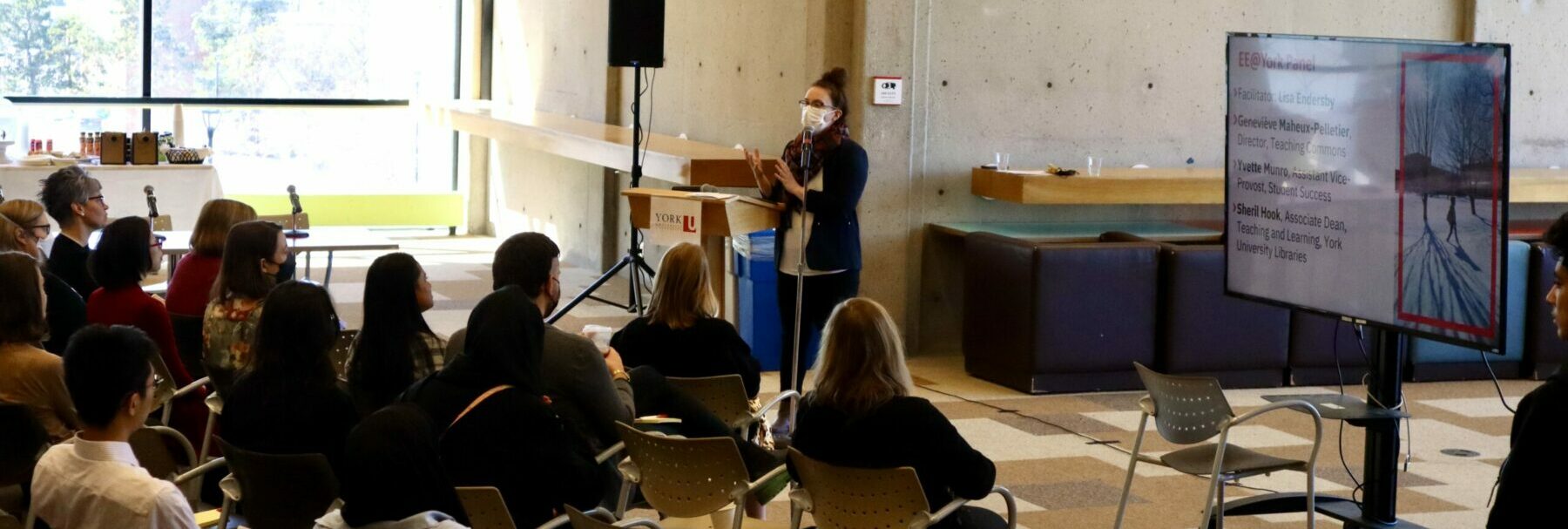By Elaine Smith
Thanks to York internship opportunities, graduating human resources student Khanh Do has a part-time job this term and Mohaimen Hassan, a third-year engineering student, has a job offer waiting for him upon graduation.
The two students, along with fifth-year geography student Averrie Vesico, were part of a March 8 panel at the EE Symposium, discussing their experiential education (EE) placements. The event was organized by a pan-University committee co-chaired by Lisa Endersby, an educational developer at the Teaching Commons, and Melanie Belore, associate director, experiential education for the Faculty of Liberal Arts &Professional Studies.
The students were excited about the growth opportunities they had thanks to their experiences. Do, who worked for electronics manufacturer Vexos, had the chance to work with a variety of software systems used to record employee data. In addition, she learned “to never give up and believe in what you do. There are a lot of opportunities out there if you are willing to put in the effort. I had the opportunity to work in different departments and transferable skills really do work.”

During his co-op with consulting firm Deloitte, Hassan realized that he loved engineering.
“I was part of an engineering team and I improved my technical, collaboration and time management skills,” he said. “I love solving problems and this solidified that belief. It made me realize I had a lot to learn and that you need to have a growth mindset throughout your life.”
Vesico went on a Reading Week research trip to gain some hands-on research skills; she is now assisting the professor who led the trip with his research.
“I would never have approached him otherwise, but the trip introduced me to scientific research,” she said. “It has encouraged me to pursue physical geography and I am considering graduate studies.”
There were other student EE opportunities offered at the symposium, too, in the form of poster presentations. For example, Utku Ugur, a master’s student in political science, and his classmates in Regional Economic Development, worked with the Town of Grimsby to improve the municipality’s marketing communications in order to attract residents and investors.
“I certainly improved my communications skills in working with township officials and my peers,” said Ugur, an international student from Turkey. “I also improved my research skills. It was an opportunity to apply theory to real life.”
Abbie Mauno, a York BFA graduate who is finishing her teaching degree here, was enthused about teaching ceramics to high school students at Northern Secondary School in Toronto.
“It’s really fulfilling,” she said. “It’s an opportunity to be in an art community and talk about art with peers. During my teaching experience, my students actually taught me a lot in return, such as how to throw on the wheel. We do a lot of co-learning.
“Ceramics is an opportunity for tangible, hands-on learning using trial and error. The students experience failure and learn to grow in a safe way, and we all learned more about tenacity, problem-solving and persistence.”
The event also featured a welcome from Will Gage, associate vice-president, teaching and learning, on behalf of the provost, calling EE an example of the University Academic Plan in action as it advanced 21st century learning. A panel of faculty and staff – Sheril Hook, associate dean of teaching and learning for York University Libraries; Geneviève Maheux-Pelletier, director of the Teaching Commons; and Yvette Munro, assistant vice-provost, student success – each discussed the value of EE from their perspectives.
“EE helps build confidence, no matter what the discipline,” said Hook. “It helps you feel employable and helps you engage with a subject you love.”
Maheux-Pelletier said, “EE provides the spark where you can understand what theories look like in the real world.”
For Munro, EE is “a chance to tie the student’s journey to the development of competencies that will benefit them when they graduate, especially in a highly competitive job market.”


